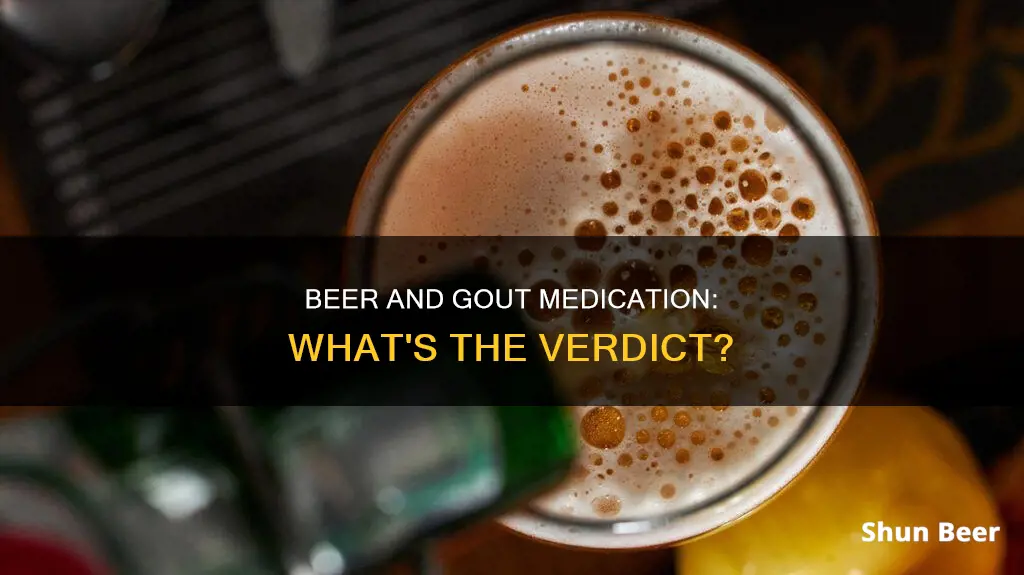
Gout is a type of arthritis that causes swelling, redness, and acute pain in joints, most commonly the big toes and ankles. It is caused by a buildup of uric acid in the body, known as hyperuricemia, which crystallizes and accumulates within the joints. Beer and other alcoholic drinks are high in purines, which are converted into uric acid by the body. As such, consuming alcohol can increase the risk of a gout flare-up. However, this does not mean that those taking gout medication need to completely abstain from drinking beer.
| Characteristics | Values |
|---|---|
| Can drinking alcohol trigger gout flares? | Yes, as little as one alcoholic beverage in a 24-hour period can cause a gout flare. The risk increases with the number of drinks. |
| What causes gout flares? | Gout is caused by hyperuricemia, a condition marked by an excess amount of uric acid in the blood. Alcohol can increase uric acid levels in the body, resulting in gout flares. |
| Which type of alcohol is the worst for gout? | Beer is the worst for gout due to its high purine content. However, all types of alcohol can trigger gout. |
| Can you drink alcohol if you have gout? | It is recommended to limit alcohol consumption to prevent gout flares. However, limited quantities are allowed. |
| Can eliminating alcohol reverse gout? | Eliminating or cutting back on alcohol alone is unlikely to lower uric acid levels enough to treat gout. |
| Can you drink alcohol while taking gout medication? | It is recommended to limit alcohol consumption, especially in the first six months after starting gout medication. However, there are no restrictions on drinking alcohol while taking allopurinol, a common gout medication. |
What You'll Learn
- Beer is high in purines, which are converted to uric acid and can trigger gout
- Alcohol affects the kidneys, causing them to excrete alcohol instead of uric acid, leading to higher uric acid levels in the blood
- Gout is caused by excess uric acid in the blood, which crystallises and accumulates within the joints, causing pain and swelling
- All types of alcohol can trigger gout, but beer is the worst due to its high purine content
- Gout sufferers should limit alcohol consumption to prevent gout episodes or flares

Beer is high in purines, which are converted to uric acid and can trigger gout
Alcoholic beverages, including beer, wine, and spirits, are high in purines. Beer contains the highest levels of purines among alcoholic drinks, with one study finding that men who drank one serving of beer daily were 50% more likely to have gout. Beer gets most of its purine content from brewer's yeast, which has about three times the purines as baker's yeast. Other high-purine foods include organ meats, red meat, pork, poultry, fish, and seafood.
The body creates uric acid when breaking down purines from purine-rich foods and beverages. When there is an excess of uric acid in the blood, it can crystallize and accumulate within the joints, triggering an inflammatory response that leads to joint pain, swelling, and issues with mobility. This is what happens in gout.
While beer and other alcoholic drinks are not the only triggers of gout, they can definitely increase the risk. A 2014 study found that participants who consumed one to two alcoholic beverages in a 24-hour period had a 1.36 times higher risk of a gout flare compared to those who consumed no alcohol. The type of alcohol consumed also matters, with beer carrying the highest risk of triggering a gout flare.
For people who have gout or are at risk of developing it, limiting alcohol consumption is recommended to prevent gout episodes or flares. Moderate alcohol intake typically refers to up to one drink per day for women of all ages and up to two drinks per day for men aged 65 and younger. However, people with gout may need to further limit their alcohol intake or avoid it altogether, especially during a gout flare.
Beer and Doxycycline: Safe Mix?
You may want to see also

Alcohol affects the kidneys, causing them to excrete alcohol instead of uric acid, leading to higher uric acid levels in the blood
Gout is a type of inflammatory arthritis that develops when there is a buildup of uric acid in the body, a condition known as hyperuricemia. This excess uric acid crystallizes and accumulates within the joints, leading to sudden and severe pain, swelling, and reduced mobility. While gout can be caused by increased uric acid production, it can also be triggered by a diet high in purines, which are organic compounds that the body breaks down and converts into uric acid.
Alcohol is a significant source of purines, and different types of alcohol contain varying types and amounts of purines. Beer, for example, is particularly high in purines, specifically a type called guanosine, which is derived from brewer's yeast. When consumed, these purines are broken down and converted into uric acid, contributing to hyperuricemia and increasing the risk of gout.
Moreover, alcohol affects kidney function, altering the rate at which uric acid is excreted. Specifically, alcohol causes the kidneys to excrete alcohol instead of uric acid, leading to higher uric acid levels in the blood. This elevated uric acid level further contributes to the formation of crystals in the joints, triggering intense pain and inflammation characteristic of gout flares.
The impact of alcohol on gout risk is evident from various studies. A 2014 study found that consuming one to two alcoholic beverages in a 24-hour period increased the risk of a gout flare by 1.36 times compared to those who consumed no alcohol. The same study also revealed that two to four alcoholic drinks in a day increased the risk by 1.51 times. Another analysis of multiple studies on alcohol consumption and gout, involving data from almost 43,000 people, demonstrated a clear link between alcohol consumption and gout risk. The more alcohol consumed, the greater the likelihood of developing gout.
In summary, alcohol affects the kidneys, disrupting the normal excretion of uric acid and leading to elevated levels in the blood. This disruption, along with the purines present in alcoholic beverages, contributes to hyperuricemia and increases the risk of gout flares. Therefore, it is generally recommended that individuals with gout limit their alcohol consumption or abstain from it altogether, especially during flare-ups.
Beer and Birth Control: Is It Safe to Mix?
You may want to see also

Gout is caused by excess uric acid in the blood, which crystallises and accumulates within the joints, causing pain and swelling
Gout is a type of arthritis that is caused by excess uric acid in the blood, which crystallises and accumulates within the joints, causing pain and swelling. This condition is known as hyperuricemia. Gout typically develops in stages, with the first stage characterised by rising uric acid levels that have not yet caused symptoms. In the second stage, the individual experiences painful gout attacks, known as flares, which are marked by sudden and severe joint pain, swelling, stiffness, and sometimes a mild fever.
Uric acid is a waste product produced by the body, carried in the bloodstream, and eliminated in the urine. While most uric acid is produced naturally by the body, certain foods and drinks, particularly those high in purines, can increase uric acid levels. Purines are organic compounds that the body breaks down and converts into uric acid. Beer is rich in purines, specifically a type called guanosine, and therefore consuming beer may worsen gout symptoms. Alcoholic beverages, in general, can increase uric acid levels in the body, as alcohol affects the rate of uric acid excretion, leading to higher levels in the blood.
Research has consistently shown a strong link between gout and the consumption of alcoholic beverages, especially beer. A 2014 study found that participants who consumed one to two alcoholic drinks in a 24-hour period had a 1.36 times higher risk of experiencing a gout flare compared to those who consumed no alcohol. The same study also revealed that the reaction time between drinking alcohol and the development of a gout flare was rapid, often occurring within 24 hours.
Beer, in particular, has been identified as a significant gout trigger due to its relatively high levels of purines. A 2019 study found the highest levels of purines in beer among various foods and beverages. Additionally, a 2004 study published in The Lancet concluded that alcohol is strongly associated with an increased risk of gout, with the highest risk observed among those who drank two or more beers daily.
While gout is influenced by multiple factors, including family history, genetics, and overall health, limiting alcohol consumption, especially beer, is an important aspect of gout management.
Centrifugal Force: Spinning Beer to Perfection
You may want to see also

All types of alcohol can trigger gout, but beer is the worst due to its high purine content
Gout is a type of inflammatory arthritis that develops in response to hyperuricemia, which is the medical term for excess uric acid in the blood. In gout, this excess uric acid crystallizes and accumulates within the joints, causing pain and swelling. Gout is usually associated with high-protein foods, but some beverages can also lead to painful symptoms.
Alcoholic drinks, particularly beer, are high in purines, which are organic compounds that the body breaks down and converts to uric acid. Overproduction of uric acid can lead to hyperuricemia, which increases the risk of gout. While all types of alcohol can trigger gout, beer is the worst due to its high purine content. Beer is rich in a type of purine called guanosine.
Research has found a strong association between gout attacks and the consumption of alcoholic beverages, especially beer. One study showed that men who drank one serving of beer daily were 50% more likely to have gout, while those who drank two or more servings were 2.5 times more likely. Another study found that two or more beers daily increased the risk of gout twofold compared to non-beer drinkers.
The amount of alcohol consumed also matters. Even a single alcoholic beverage in a 24-hour period can cause a gout flare, and the risk increases with each additional drink. It is recommended that people with gout limit their alcohol intake, especially during the first six months after starting uric acid-lowering medication.
If you have gout and are experiencing a flare-up, you may want to avoid alcohol until your condition is under control with medication. While there is no cure for gout, treatments can slow its progression and reduce the frequency and severity of gout flares.
Drinking Six Beers: Puking Probability?
You may want to see also

Gout sufferers should limit alcohol consumption to prevent gout episodes or flares
Gout is a form of inflammatory arthritis that develops in response to hyperuricemia, or excess uric acid in the blood. This excess uric acid crystallizes and accumulates within the joints, causing pain and swelling. While gout is often associated with high-protein foods, certain beverages can also lead to painful symptoms.
Alcoholic drinks, particularly beer, are high in purines, which are organic compounds that the body breaks down and converts to uric acid. Beer gets most of its purine content from brewer's yeast, which has about three times the purines as baker's yeast. Beer drinking doesn't necessarily lead to gout, but it can trigger flare-ups in those who already have the condition.
Research has shown that high alcohol consumption is an independent risk factor for developing gout. A 2014 study found that participants who had gout and consumed one to two alcoholic beverages in 24 hours increased their risk of having a gout flare by 1.36 times compared to those who consumed no alcohol within the same period. The risk increased to 1.51 times for those who consumed two to four drinks.
The amount and type of alcohol consumed matter. Even one alcoholic beverage in a 24-hour period can cause a gout flare, and the risk increases with each additional drink. Beer has the highest purine content among alcoholic drinks and is strongly associated with gout attacks. Spirits have the lowest purine content, while wine seems to be the least likely to trigger gout flares.
For these reasons, gout sufferers should limit their alcohol consumption to prevent gout episodes or flares. Doctors recommend that people with gout cut back on alcohol, especially in the first six months after starting uric acid-lowering medication. If gout is well-managed with medication, occasional intake of small amounts of alcohol is generally considered okay. However, heavy drinking may trigger gout flares, especially in those who are not on medication or are in the early stages of treatment.
It is important to note that gout is a genetic disease, and dietary changes alone may not be enough to control it. Medication is often necessary to effectively manage the condition and reduce the risk of permanent joint damage.
Alcoholics and Ginger Beer: Is It Safe to Drink?
You may want to see also
Frequently asked questions
Beer is not recommended for people with gout due to its high purine content, which can increase the risk of gout flares. Beer drinking is a common trigger for gout attacks, and it is recommended that people with gout limit their alcohol consumption to prevent flares.
It depends on the medication. There are no restrictions on drinking alcohol while taking allopurinol, a common gout medication. However, other gout medications, such as non-steroidal anti-inflammatory drugs (NSAIDs), may interact with alcohol, so it is important to consult a doctor or pharmacist before consuming alcohol with any medication.
Alcohol can trigger gout flares by increasing uric acid levels in the body. Gout is caused by hyperuricemia, or excess uric acid in the blood, which can form crystals that accumulate in the joints, causing pain and inflammation. Alcohol can also affect kidney function, impacting how uric acid is eliminated from the body.
Spirits have the lowest purine content among alcoholic drinks, while beer has the highest. However, all types of alcohol can affect gout, and it is recommended to limit alcohol consumption or avoid it altogether to prevent gout flares.
Yes, non-alcoholic beverages such as non-alcoholic seltzers and mocktails (zero-proof beverages) can be good alternatives to alcohol when socialising. However, it is important to avoid drinks that are sweetened with sugar, fructose, or high-fructose corn syrup, as these can also raise uric acid levels.







